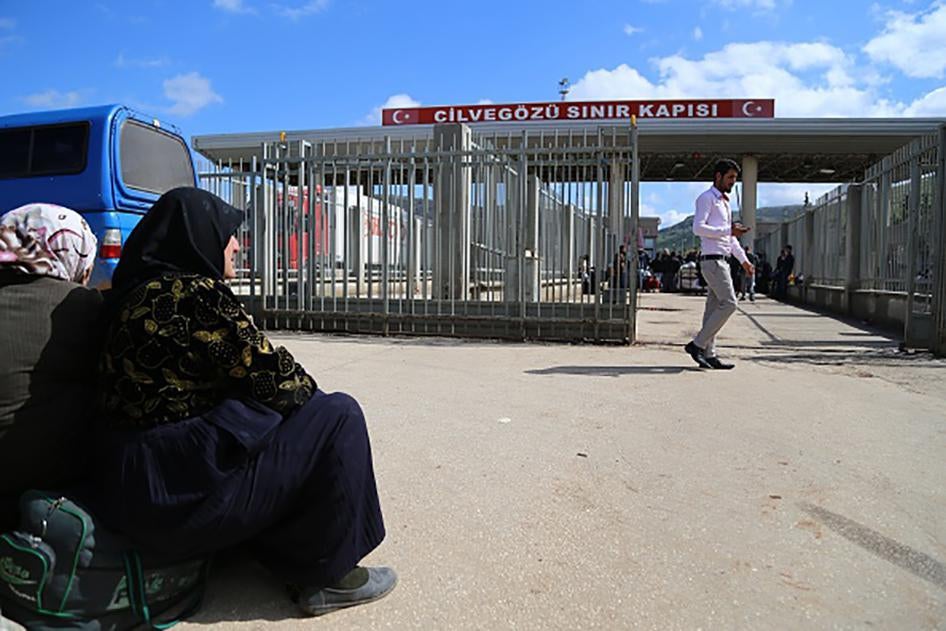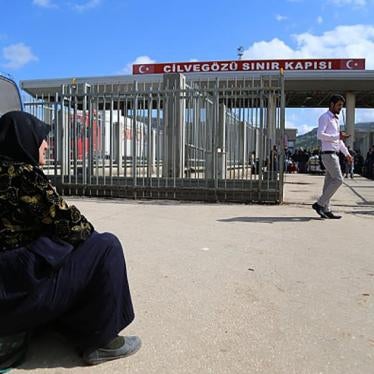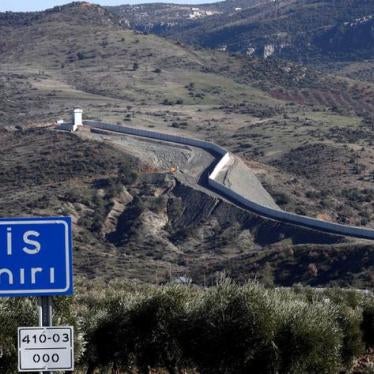"I was deported with about 35 Syrians on a large bus. They handcuffed us and…they beat some of the men on the bus with truncheons when they asked to go to the toilet or for water. We all spoke with each other [and] no one wanted to go back to Syria."
Do those sound like the words of refugees who freely signed papers asking Turkey to return them to an active conflict zone in northern Syria?
In July and September, my colleague and I interviewed 18 Syrian refugees by phone.
They all said Turkish authorities in Istanbul and Antakya had arbitrarily detained them in immigration removal centers and forced them to sign forms they were not allowed to read but that they believed were voluntary repatriation forms. In some cases, they said, Turkish officials beat and threatened those who refused to sign.
They said the Turkish authorities then handed them over to the Syrian authorities at Turkey's border with the war-ravaged Idlib governorate.
There they are in grave danger from the Syrian-Russian alliance's attacks on civilians, including deadly attacks on displacement camps.
In late October, Amnesty International reported on 20 similar cases, while Istanbul's Bar Association said that between early July and about August 20, it had received 180 complaints of police misuse of voluntary return forms.
In late July, Turkey's interior minister, Süleyman Soylu, denied that Turkey had "deported" Syrians. He said that anyone "who voluntarily wants to go back to Syria" can sign voluntary return forms allowing them to return to unspecified "safe areas."
A Turkish foreign ministry spokesman said in late October that claims Syrians have been deported and abused were "untrue and imaginary" and that Turkey is "studiously implementing [its] policy of 'non-refoulement' (referring to the international prohibition on returning anyone to a place where they would face a real risk of persecution, torture or other ill-treatment, or a threat to life)."
Hosting 3.65 million people
Turkey still shelters 3.65 million Syrians - four times more than the entire European Union - under a "temporary protection" regulation Turkish authorities say automatically applies to all Syrians seeking asylum.
But Turkey's generosity and the EU's unwillingness to take in more Syrian refugees has come at a high price, with the recent deportation of some Syrians from Turkish cities to Idlib just the latest of a long-running series of abuses.
Turkey initially had an open border policy for Syrian refugees.
But in 2015, Turkey closed its border with Syria, leaving 1.5 million Syrians now trapped with little assistance in displacement camps and villages in Idlib and Aleppo governorates on Syrian side.
Turkish border guards carry out mass summary pushbacks. They have killed and injured Syrians who tried to cross.
In late 2017 and early 2018, Istanbul and nine provinces on the border with Syria suspended registration of newly-arriving asylum seekers.
Turkey should clearly end these abuses, but the EU also needs to reverse course on its own problematic policies toward Syrian refugees.
The EU spent at least €55m to support Turkish immigration reception and detention centres between 2011 and 2015.
EU migration management support continued under its March 2016 $6bn [€5.3bn] deal with Turkey.
The deal essentially involved the EU funding refugee-related projects in exchange for Turkey stopping the flow of refugees to the EU, while the EU maintained that Turkey is a safe country to which to return Syrian asylum seekers.
Yet Turkey has never met the EU's safe third country criteria, which require effective protection and access to jobs and services.
And the recent deportations from Syria's cities show that a Syrian forcibly returned from Greece could face onward refoulement to Syria.
The recent deportations might also just be the beginning.
In September, president Recep Tayyip Erdoğan said that Turkey would seek to set up a safe zone in territories held then by the Kurdish-led autonomous administration in northeastern Syria to which between one million and three million Syrian refugees could return.
The Turkish government promised there would be no forced returns.
Following Turkey's military incursion, on October 22, Turkey and Russia agreed to joint patrols of most of those territories.
Regardless of any assurances, "safe zones" established during other conflicts have rarely been safe, and cannot justify forcibly returning refugees.
The European Union should continue to support the registration and protection of Syrian refugees in Turkey, but it should also resettle more Syrian refugees from Turkey.
The European Commission should urgently publicly acknowledge that Turkey is committing grave abuses against Syrians, press Turkey to end them, and press the UN refugee agency to monitor whether Syrians detained in immigration removal centers or other facilities actually wish to remain in Turkey.










